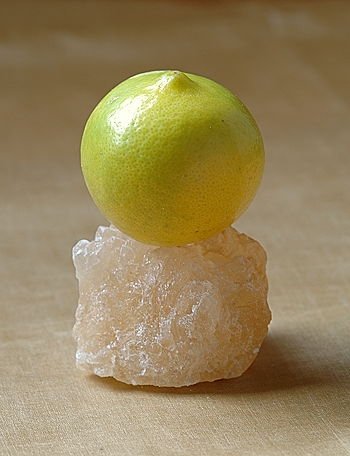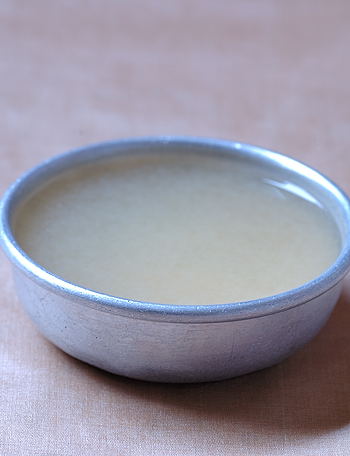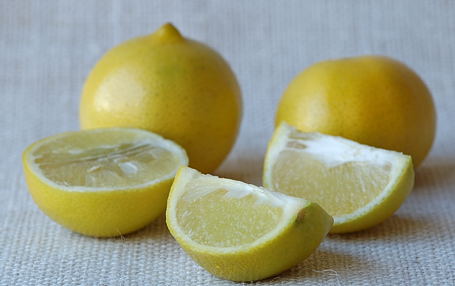
Mitha Nimboo (Sweet Lemons, Karinaaranga)
Nandyala is closer than ever here in Seattle for me. I am able to find all kinds of vegetables and fruits, which I’d normally find in India, without looking hard. Even in winter. Example is these sweet lemons or mitha nimboo. We purchased them last week from a grocery store named Lenny’s Market. I’ve never thought I’d see this type of lemons outside of India, but here they are, for sale in Seattle, unbelievably fresh and at low prices.
Usually, we prepare lemonade with sweet lemons. The lemonade tastes like plain, flat sugary water without the acidity and perfume of lemons. The juice is naturally very sweet, similar to kalkand water. Prepared mainly for children during hot summer months of Andhra. That’s only thing we do with them but LG of Ginger and Mango recently wrote a Kerala recipe with sweet lemons called “Karinaaranga Curry” (Lemon Curry) – combination of curry and pickle. I had to try.
Unlike the regular lemon pickle, there is no mandatory 2-week waiting for this one. Preparation method is also different. Here we steam-cook the sweet lemons as whole. Then cut and simmer them with pickle masala powder, salt, little bit of tamarind and jaggery. Curry leaves touch of tempering. That’s it. It’d be ready to have immediately with rice, and with breakfast items like upma, dosa etc. Mildly hot and spicy, little bit sour and bitter without the characteristic lemony puckering effect. Metha Nimboo pickle is definitely different from the regular pickle and worth a try. This is my first time; still it came out good and tasty. All because of Dear Inji Pennu’s neat recipe instructions. Thanks Inji Pennu and a very Merry Happy New Year to you!
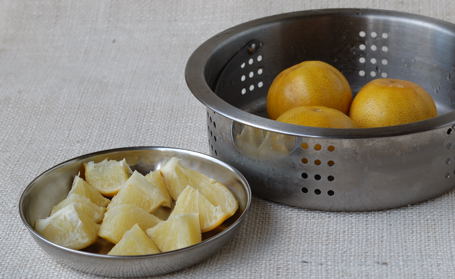
Steam-Cooked Mitha Nimboo/Sweet Lemons ~ Ready for Pickling
Recipe:
Prep work:
1. Soak lemon-sized tamarind in warm water for about 30 minutes to soften. Squeeze juice and keep it aside.
2. Fill a big pot with water and bring it to a boil. Insert the perforated vessel suitable to steam cook. Drop 4 sweet lemons in it. Cover the pot and cook them for about 15 to 20 minutes, until the firm skin softens a bit (like shown in the photo above). Remove them from the vessel. Cut – half and half and then quarter them to small pieces. Remove seeds.
3. Meanwhile prepare the pickle masala. Roast and grind following items:
1 tablespoon each – urad dal, chana dal, raw rice, coriander seeds
1 teaspoon – fenugreek seeds (menthulu)
8-10 each – dried red chillies and curry leaves
Roast them in an iron skillet one by one or all together to gold color.
Grind them all to smooth powder in a grinder or spice mill.
Preparing the Pickle:
In a non-reactive saucepan, combine tamarind juice and pickle masala. Stir in 2 cups of water and a tablespoon each- powdered jaggery and salt. Cook for about 5 minutes on medium heat, stirring frequently. Add the cut, steam-cooked sweet lemon pieces. Reduce the heat to medium-low. Cover and simmer for about 15 to 20 minutes, stirring in-between, until the mixture becomes thick. Keep the heat as low as possible to prevent burning.
Just before when you turn off the heat. Do the popu or tadka. In a small pan, heat a tablespoon of peanut or sesame oil. Add a teaspoon each – dried red chilli pieces, curry leaves, cumin and mustard seeds. Toast them to red and when mustard seeds start to dance around – add the whole thing to the pickle and mix thoroughly.
When the pickle is cool enough, transfer it to clean, dry glass/ceramic jar with non-reactive airtight lid. I’ve prepared this pickle last week and kept in the refrigerator. It’s good stuff.
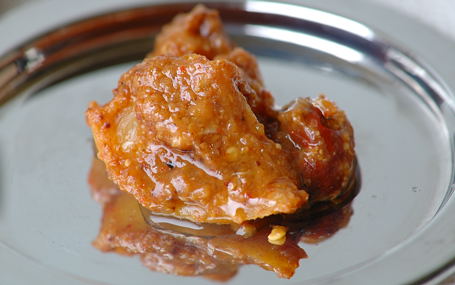
Mitha Nimboo Chutney (Pickle with Sweet Lemons)
Recipe source: Karinaaranga Curry (Lemon Curry) from Inji Pennu of “Ginger and Mango”
sweet lemons for sale in Chennai
More about sweet lemons – here
Mitha = sweet, Nimboo= lemon/lime
